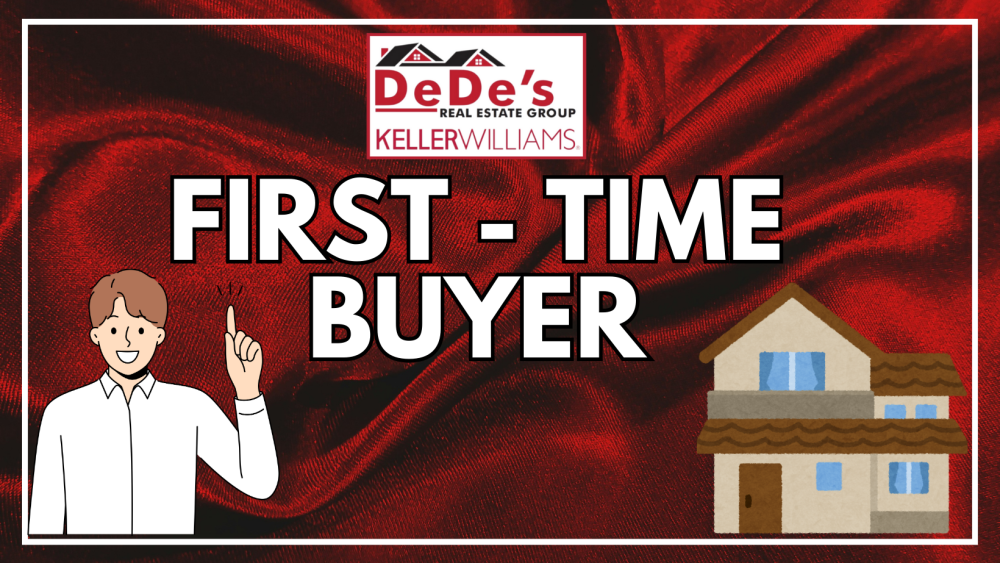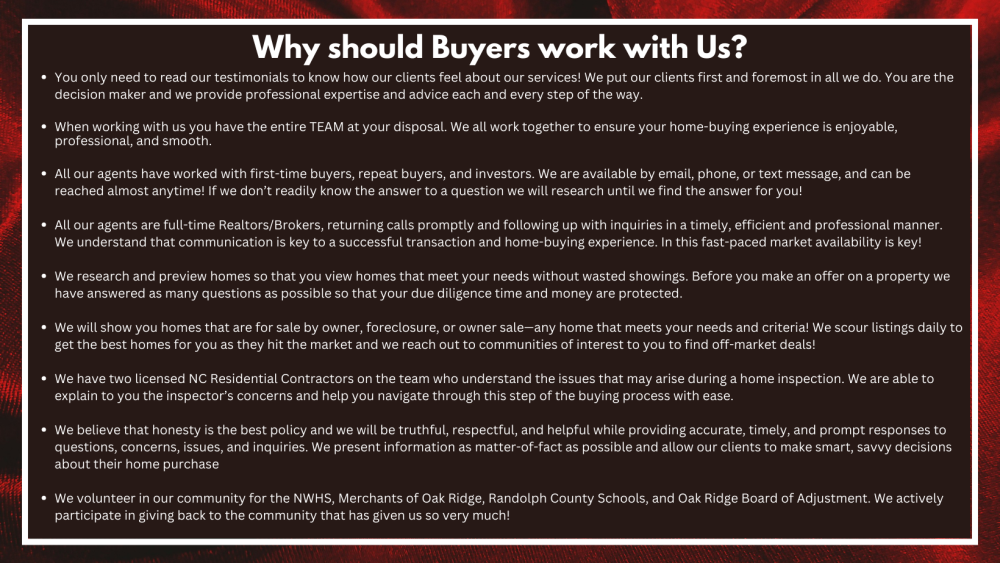First-Time Buyer
___________________________________________________________________________________________________________________________________
Commonly Used Terms
· Annual Percentage Rate (APR): The total yearly cost of a mortgage as expressed by the actual rate of interest paid. The APR is thus invariably higher than the rate of interest that the lender quotes for the mortgage.
· Appraisal: Mortgage lenders require an appraiser to give an opinion of the market value of a house a homeowner wants to sell or refinance. This professional opinion helps to protect the lender from lending money on a house that is worth less than the amount the buyers have agreed to pay for it on that the seller wishes to obtain when refinancing the existing loan.
· Assessed Value: The value of a property for the purpose of determining property taxes. This figure depends on the methodology used by local tax assessor and may differ from appraised or market value of the property.
· Buydown: The builder or seller agrees to pay part of the home buyer’s mortgage for the first few years. The term also refers to the practice of a seller paying a mortgage lender a predetermined amount of money to reduce his or her mortgage interest rate, thereby creating more attractive financing for a potential buyer. Veterans with low or modest incomes may be able to get buydowns through a Veterans Administration loan plan that is available in some new housing developments.
· Cash Reserve: Most mortgage lenders require that homebuyers have sufficient cash left over after closing on their home purchase in order to make the first two mortgage payments or to cover financial emergency.
· Closing Cost: These cost generally total from 2 to 5 percent of the home’s purchase price and are in addition to the down payment. Closing cost include such things as points (that is loan origination fee to cover lender’s administrative cost), an appraisal fee, a credit report fee, mortgage interest for the period between the closing date and the first mortgage payment, homeowners insurance premium, title insurance, prorated property taxes and recording and transferring charges. So when you are finally ready to buy, you need to have enough cash to pay all these cost in order to buy your dream home.
· Comparable Market Analysis (CMA): In order to determine the price you want to offer, you need to know current sales prices and recent sold prices of houses like the one you are considering. Identical houses “comparable” to yours that sold within the last six months, are in the immediate vicinity of your house and are as similar as possible to your house in terms of size, age and condition. By analyzing the sale prices of houses comparable to yours that are currently on the market, you can see whether prices are rising, flat or declining. A written analysis of this information is called a comparable market analysis (CMA).
· Contingency: Conditions contained in almost all home purchase offers. The seller or buyer must meet or waive all contingencies before the deal can be closed. These conditions relate to such factors as the buyer’s review and approval of property inspections or the buyer’s ability to get the mortgage financing that is specified in the contract. Sellers may include contingencies as well, such as making the sale of their home contingent upon their successful purchase of another home. If a contingency cannot be met, the party for whom it was established may legitimately withdraw from a contract.
· Corporate Home: A home previously owned by an employee whose corporation transferred him. In the process he was unable to sell his home and the corporation purchased the house from him in order to allow him to move to his new location.
· Co-Signer: Past credit issues may require you to have help securing a mortgage, even though you are financially stable. A friend or relative can come to your rescue by cosigning (which literally means being indebted for) a mortgage. A cosigner cannot improve your credit report, but can improve your chances of getting a mortgage. Cosigners should be aware, however, that cosigning for you loan will adversely affect their future creditworthiness since your loan becomes what is known as a contingent liability against their borrowing power.
· Credit Report: A report lenders use to determine an applicant’s credit worthiness. Applicants must pay for a lender to obtain this report, which the lender uses to determine the applicant’s ability to handle all forms of credit and to pay off loans in timely fashion.
· Debt-to-Income Ratio: Before you begin looking for a new home, you should determine what your price range is. Lenders generally figure that you shouldn’t spend more than about 33 to 43 percent of your monthly income for you housing cost. The debt-to-income ratio measures your future monthly housing expenses, which include your proposed mortgage payment (debt), property taxes and insurance, in relation to your monthly income.
· Delinquency: Delinquency occurs when a monthly mortgage payment is nor received by the due date. The first time, missed payment is delinquent, the next time, missed payment puts you in default.
· Down Payment: The part of the purchase price that the buyer pays in cash, upfront, and does not finance with a mortgage. Generally, the larger the down payment, the better terms you can get on a mortgage.
· Earnest Money: A home buyer’s “good faith” deposit that accompanies a written purchase offer.
· Fixed-Rate Mortgage: Loan terms that include a stable, unchanging interest rate (for example, 8.5 percent) for the life (term) of you 15 or 30 year mortgage. Your mortgage payment will be the same amount each and every month. Compare fixed-rate mortgages with adjustable-rate mortgage.
· Foreclosure: A legal process whereby property pledged as security for a debt is sold to satisfy a debt in the event of a default in payments or terms.
· FSBO: A property that is for Sale By Owner and is not listed through a real estate broker.
· Home Warranty Plan: A type of insurance that covers repairs to specific parts of the home for a predetermined time period.
· Home Insurance: This is required and necessary. You must have “dwelling coverage” that can cover the cost to rebuild your house. The liability insurance portion of this policy protects you against accidents that occur on your property. Another essential piece is the personal property coverage that pays to replace your lost worldly possessions and usually totals 50 to 75 percent of the dwelling coverage. Finally, get flood or earthquake insurance if you’re in an area susceptible to these natural disasters. As with other types of insurance get the highest deductibles with which you are comfortable.
· House Inspection: Like homeowners insurance, we think that a house inspection is a necessity. The following should be inspected; overall condition of the property inside and out, electrical, heating, and plumbing systems, foundation, roof, pest control and dry rot. A good house inspection can save you money by locating problems. With the inspection report in hand, your Realtor can ask the seller to either do repairs or reduce the purchase price.
· Interest: Lenders usually require borrowers to pay the interest that accrues from the date of settlement to the first monthly payment.
· Interest Rate: Interest is what lenders charge you to use their money. Lenders generally charge higher rates of interest on higher-risk loans. For fixed-rate mortgages, remember that the interest rate has a seesaw relationship with the points. A high number of points is usually associated with the lower interest rate, and vice versa. For an adjustable-rate mortgage, make sure that you understand the formula (the index plus the margin) that determines how the interest rate is calculated after the teaser rate expires.
· Legal Fees/ Attorney Fees: Costs relating to having an attorney or law firm review and prepare the needed documents for your closing. These cost may include, deed preparation (this cost is paid for by the seller), title search and closing packet preparation.
· Lock-In: A lock-in is a mortgage lender’s commitment and written agreement to guarantee a specific interest rate to the homebuyer, provided that the loan is closed within a set period of time.
· Loan Origination: This fee is sometimes called a “point” or “points”. It covers the lender administrative cost in processing the loan. Often expressed as a percentage of the loan, the fee will vary among lenders. Generally, the buyer pays the fee, unless otherwise negotiated.
· Multiple Listing Service: (MLS) is a real estate agents’ cooperative service that contains descriptions of most of the houses that are for sale. Real estate agents use this computer-based service to keep up with properties listed for sale by members of the Multiple Listing Service in the area.
· Notary Fee: This fee is charged for the cost of having a person who is licensed as a notary public swear to the fact that the persons named in the documents did, in fact, sign them.
· Points: Also known as a loan’s origination fee, points are interest charges paid up-front when you close on your loan. Points are actually a percentage of your total loan amount (one point is equal to 1 percent of the loan amount). For a $100,000 loan, 1 point cost you $1,000.
· Pre-paids/ Escrow Account Deposits: These costs are for the payment of taxes and /or insurance and other items that must be made at settlement to set up an escrow account. The lender is not allowed to collect more than a certain amount.
· Principal: The principal is the amount that you borrow for a loan. If you borrow $100,000, your principal is $100,000. Each monthly mortgage payment consist of a portion of principal that must be repaid plus the interest that the lender is charging you for the use of the money. During the early years of your mortgage, your loan payment is primarily interest.
· Private Mortgage Insurance (PMI): If the down payment is less than 20 percent of a home’s purchase price, the borrower will probably need to purchase private mortgage insurance (also known as “mortgage default insurance”). Lenders feel that homeowners who can only come up with small down payments are more likely to default on their loans. Therefore, lenders make these homeowners buy PMI, which reimburses them the loan amount in case the borrower does default. Private mortgage insurance can add hundreds of dollars per year to loan cost. After the equity in the property increases to 20 percent, borrower no longer need the insurance. Do not confuse this insurance with the mortgage life insurance.
· Property Disclosure Statement: Some states require that sellers give prospective buyers a written disclosure regarding all know property defects and all known material facts that may affect the property’s value or desirability.
· Prorations: Certain items such as property taxes and homeowner association dues are continuing expenses that must be prorated (distributed) between the buyers and sellers at closing. IF the buyers, for example, owe the sellers money for property taxes that the sellers paid in advance, the prorated amount of money due the sellers at closing is shown as a debt (charge) to the buyers and a credit to the sellers.
· Recording Fees: The cost for having the new deed recorded. This will put your name in the public records as the owner of the home. Usually around $35.
· REO: An REO (Real Estate Owned) is a property that goes back to the mortgage company after an unsuccessful foreclosure auction. i.e.- property owned by a bank, such a foreclosures, deed in lieu, etc.
· Settlement or Closing Fee: This fee is paid to the settlement agent or escrow holder. The cost of the fee is typically set by the closing attorney’s office.
· Short Sale: This occurs when the proceeds of a real estate sale fall short of the balance owned on the property. The bank forgives the short fall.
· Survey: The lender may require that a surveyor conduct a property survey. This a protection to the buyer as well. Usually the buyer pays for the surveyor’s fee, but sometimes this may be paid by the seller.
· Tax Deductible: Refers to payments that you may deduct against your federal and state taxable income. The interest portion of your mortgage payments, loan points and property taxes are tax deductibles.
· Title Insurance: Covers the legal fees and expenses necessary to defend your title against claims that may be made against your ownership of the property. The extent of your coverage depends upon whether you have an owner’s standard coverage or extended coverage title insurance policy. To get a mortgage, you also have to buy a lender’s title insurance policy to protect your lender against title risk.
· Zoning: Certain city and county government bodies have the power to regulate the use of land and buildings. For example, the neighborhood where your house is located in probably zoned for residential use. It most likely also has zoning codes or ordinances to regulate building heights, yard sizes, and the percentage of lot coverage by buildings.
___________________________________________________________________________________________________________________________________
Credit Do’s and Dont’s During Loan Application
When you fill out a credit application, we run a credit report for the underwriter. Each lender and each loan program has different guidelines they must follow. You should not do anything that will have an adverse effect on your credit score while your loan is in process. We know it’s tempting...If you’re moving into a new to go shopping with your credit cards. You’ll want to remain in a stable position until the loan closes and give us the opportunity to maintain approvals without extra documentation.
Here is a handy list of do’s and don’ts that you should adhere to after your loan application has been started.
There may be instances where you are instructed to the items below:
DON’T APPLY FOR NEW CREDIT OF ANY KIND:
If you receive invitations to apply for new lines of credit, don’t respond. If you do, that company will pull your credit report and this will have an adverse effect on your credit score. Likewise, don’t establish new lines of credit for furniture, appliances, computers, etc.
DON’T PAY OFF COLLECTIONS OR CHARGE−OFFS:
Once your loan application has been submitted, don’t pay off collections unless the lender specifically asks
you to in order to secure the loan. Generally, paying off old collections causes a drop in the credit score. The
lender is only looking at the last two years of activity.
DON’T CLOSE CREDIT CARD ACCOUNTS:
If you close a credit card account, it can affect your ratio of debt to available credit which has a 30% impact on your credit score. If you really want to close an account, do it after you close your mortgage loan.
DON’T MAX OUT OR OVER CHARGE EXISTING CREDIT CARDS:
Running up your credit cards is one of the fastest way to bring your score down. Once you are engaged in the loan process, try to keep your credit card balances close to where they are on the credit report. Only pay down balances if instructed to so… it may be necessary to document more money in the bank, so paying down debt when it is not needed,may actually hurt your deal.
DON’T CONSOLIDATE DEBT TO ONE OR TWO CARDS:
Once again, we don’t want you to change your ratio of debt to available credit. Likewise, you want to keep
beneficial credit history on the books.
DON’T RAISE RED FLAGS TO THE UNDERWRITER:
Don’t co−sign on another person’s loan, or change chances of last minute documentation needs.
DO STAY CURRENT ON EXISTING ACCOUNTS:
Late payments on your existing mortgage, car payment, or anything else that can be reported to a CRA can cost you dearly. One 30−day late payment can cost anywhere from 30 to 75 points on your credit score.
DO CONTINUE TO USE YOUR CREDIT AS YOU NORMALLY WOULD:
Red flags are easily raised within the scoring system. If it appears you are diverting from your normal spending patterns, it could cause your score to go down. For example, if you’ve had a monthly service for Internet access billed to the same credit card for the past three years, there’s really no reason to drop it now. Again, make your changes after the loan funds.
DO CALL YOUR MORTGAGE PLANNER:
If you receive notification from a collection agency or creditor that could potentially have an adverse effect on your credit score, call us so we can try to direct you to the right resources and prevent any derogatory reporting to credit bureaus.
___________________________________________________________________________________________________________________________________
You’re Ready to Make an Offer!
Do’s and Don’ts for a Smooth Transaction
Sales Contract
- Earnest money and due diligence checks must be written from an account that has your name on it and it must be an account that we are verifying during your loan process. (Exceptions are possible, please confirm prior to completion.)
- Approved Personal Property to include household appliances only. All other items should be negotiated separately.
Assets
- Do not make any large deposits into your bank account without first discussing with us.
- Do not transfer money between accounts while your loan is in process. This will require additional documentation that could delay your closing.
Credit
- Do not charge any excessive amounts to your current credit cards (increasing balances can cause red flags and a new credit report may be required). This could change your loan approval.
- Do not open any new credit accounts or incur any additional debt while your loan is in process. Any new accounts could change your loan approval.
General
- Do not change jobs during the loan process.
- Please set up your Hazard policy as soon as you can. Any delay in this could cause a delay in the closing date.
- Please provide all requested documentation to the lender within 48 hours of the request to ensure timely processing of your file.
___________________________________________________________________________________________________________________________________
___________________________________________________________________________________________________________________________________
INFORMATIONAL WEBSITES
North Carolina Department of Transportation
- www.ncdot.gov/projects
- www.dotstate.nc.us
Guilford County Schools
- www.gcsnc.com
Forsyth County Schools
- www.wsfcs.k12.nc.us
Asbestos
- www.era.gov/asbestos
Greensboro Department of Transportation
- www.greensboro-nc.gov
Winston Salem Department of Transportation
- www.cityofws.org
North Carolina Sex Offender Registry
- http://sexoffender.ncdoj.gov
Crime Rates:
Guilford County - www.guilfordsheriff.com
Greensboro - www.greensboro-nc.gov/departments/police/statistics
City of Winston - www.cityofws.org/home/departments/statistics/police/wspdstatistics
Town of Kernersville
- http://toknc.com
City of Greensboro
- www.greensboro-nc.gov
City of Winston-Salem
- www.cityofws.org
Piedmont Triad International Airport
- http://www.flyfrompti.com
Fedex Distribution Facility in Guilford County
Mr. Mickie Elmore
Piedmont Triad Airport Authority
Po Box 35445
Greensboro, NC 27425
(336) 665-5600
Pine Needle LNG Company- Stokesdale/Summerfield/Oak Ridge Area
Federal Regulatory Commission
1-202-208-1371
Assessment Docket #CP96-52-000





